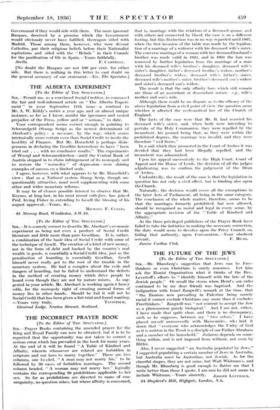THE INCORRECT PRAYER BOOK
[To the Editor of THE SPECTATOR.] SIR,—Priyer Books containing the amended prayer for the King and Royal Family can now be obtained, but it is to be regretted that the opportunity was not taken to correct a serious errorxhich has prevailed in the book for many years. At the end of it .will be found ".A Table of Kindred and Affinity, wherein whosoever are related are forbidden in scripture and our laws to marry together." , There are two columns, one Leaded, "A man may not marry his," to be followed by 30 cases of forbidden marriages. The second column headed, " A woman may not marry her," logically contains the corresponding 80 prohibitions-applicable to her sex. So far as prohibitions are directed to cases of con- sanguinity, no question arises, but where affinity is ebncerned,
that is, marriage with the relations of a deceased spouse, and with others not connected by blood, the ease is on a different footing, but this distinction was in no way regarded until 1907, when the first invasion of the table was made by the legalisa- tion of a marriage of a widower with his deceased wife's sister. The converse marriage of a woman with her deceased husband's brother was made valid in 1921, and in 1981 the ban was removed by further legislation from the marriage of a man with his deceased wife's brother's daughter, deceased wife's sister's daughter, father's deceased brother's widow, mother's deceased brother's deceased wife's father's sister, deceased wife's mother's sister, brother's deceased son's widow and sister's deceased son's widow.
The result is that the only affinity bars which still remain are those of an ascendant or descendant- nature—e.g., wife's
mother and soli's wife. • - Although there could be no dispute as to the efficacy of the above legislation froth a civil point orViciv. the question arose whether it affected the ecclesiastical law of the Church of -England. • The facts of the case were that Mr. B. had married his deceased wife's sister. and, when both were intending to partake of the Holy Communion, they were repelled b, the incumbent, his ground being that, as they were within the prohibited degrees, the marriage was invalid, and they Were therefore "evil livers."
In a suit which they promoted in the Court of Arches if Was decided that they had been illegally repelled, and the incumbent was admonished.
' Upon his appeal successively to the High Court. C'ourt' of Appeal and the House of Lords, the decision of all the judges adjudicating was to confirm the judgement of • the Dean of Arches.
- Undoubtedly, the result of the case is that the legislation in question has not only a civil effect, but is binding -also upon the Church.
Naturally, the decision would cover all the exemptions in the later Acts of Parliament, all being in the same category. The conclusion of the whole matter, therefore, seems to be that the marriages formerly prohibited, but now allowed, should be recognised as moral and legal in every sense, by the • appropriate revision of the " Table of Kindred and Affinity."
As the three privileged publishers of the Prayer Book have failed to take the initiative in making the necessary correction, the duty would seem to devolve upon the Privy Council, or, failing that authority, upon Convocation.—Your obedient










































 Previous page
Previous page